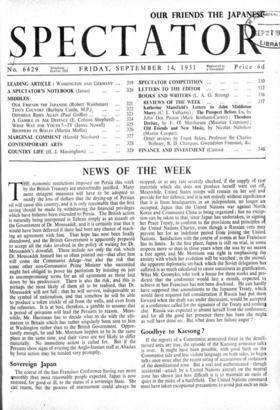Sovereign Japan
The course of the San Francisco Conference having run more kmoothly than most reasonable people expected, Japan is now restored, for good or ill, to the status of a sovereign State. She can rearm, but the process of rearmament could always be • stopped, or at any rate severely checked, if the supply of rag) materials which she does not produce herself were cut off,j Meanwhile, United States troops will remain on her soil and provide for her defence, and it is not entirely without significance that it is from headquarters in an independent, no longer an! occupied, Japan that the United Nations war against North., Korea and Communist China is being organised ; but no excep-I tion can be taken to that, since Japan has undertaken, in signing her Peace Treaty, to conform to the provisions and principles of the United Nations Charter, even though a Russian veto may prevent her for an indefinite period from joining the United Nations. Satisfaction with the course of events at San Francisco has its limits. In the first place, Japan is still on trial, in some. respects more so than in those years when she was by no means a free agent, and Mr. Morrison was right in emphasising the anxiety with which her evolution will be watched ; in the second, the apparent diplomatic set-back which the Soviet delegation has suffered is as much calculated to cause uneasiness as gratification.. What Mr. Gromyko, who took a house for three weeks and pre- dicted that the conference would last a month, expected to. achieve at San Francisco has not been disclosed. He can hardly have supposed that amendments to the Japanese Treaty, which would have required full consideration if Russia had put them forward when the draft was under discussion, would be accepted at a conference called for the signature of the Treaty and nothing else. Russia was expected to absent herself from the conference, and for all the good her presence there has been she might as well have done so. But what does her failure augur ?


































